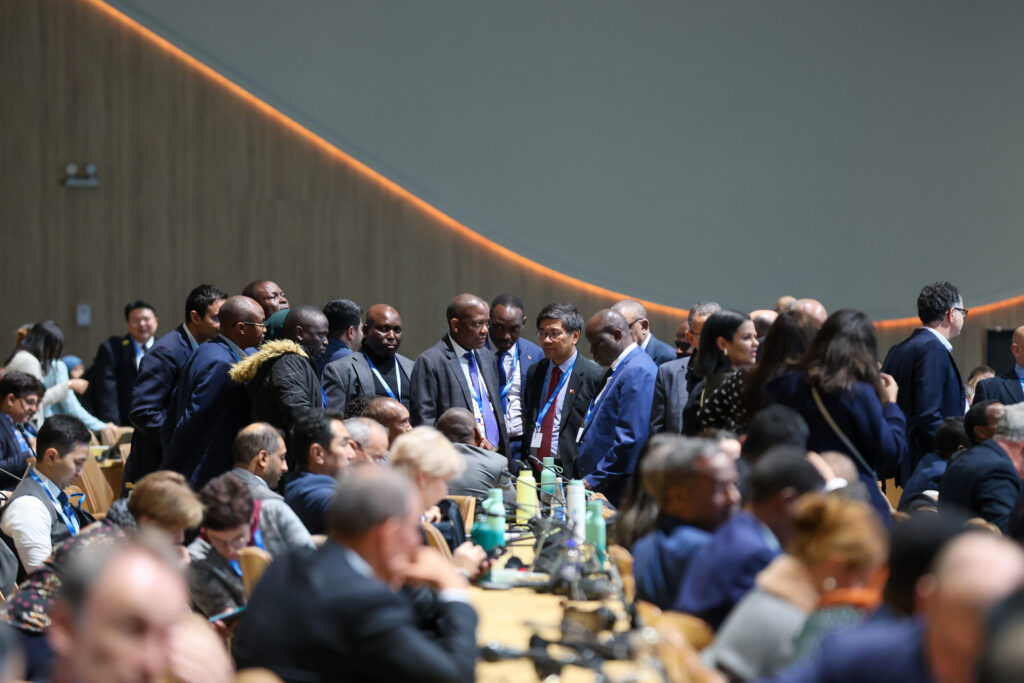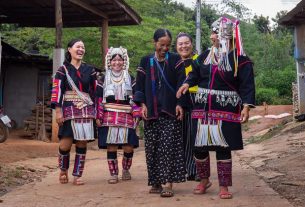African Perspectives on International Climate Change Law – Challenges and Opportunities for Justice
Hajer Gueldich*
We find ourselves at a time when Africa is trying to tackle one of the greatest contemporaneous challenges of our planet—that of climate change. As the effects of climate change become increasingly evident worldwide, Africa, a continent of diverse ecosystems and cultures, faces a myriad of challenges exacerbated by its impacts.
Rising sea levels pose a significant threat to coastal communities, many of which are densely populated and economically vibrant. Many African communities face the stark reality of droughts that wither crops and dry up wells, igniting a fight for food security amidst shrinking resources. Desertification is becoming increasingly common, leading to the loss of arable land and threatening food security for millions of people across the continent. Extreme weather events, such as cyclones and floods, are becoming more frequent and severe, displacing communities and disrupting livelihoods. While statistics that tell our story abound, it is the lived experiences of individuals and communities at the forefront of climate change that bear witness to how this dreadful phenomenon is unfolding.
These challenges are further compounded by the limited resources and capacity to adapt, making Africa particularly vulnerable to the effects of climate change. Despite contributing minimally to global greenhouse gas emissions, Africa is disproportionately affected by the consequences of climate change, highlighting the urgent need for action to mitigate its impacts and build resilience in the region. As we face these profound challenges, it is imperative that we pursue opportunities for justice and resilience that not only meet but surpass the scale of the challenges.
Regional Normative Responses
The narrative surrounding Africa’s encounters with international law was one of passive acceptance. This is a result of the systemic erasure of African States from the history of the development of international law, and Africa not receiving credit for contributing to the making of international law in the postcolonial era. In reality, however, African States emerging from colonialism actively challenged the Eurocentric foundations of international law. In recent years, Africa has also been pioneering a unique approach to climate change law.
African legal frameworks, both at the national and regional levels, prioritize the adaptation of strategies due to the continent’s unique vulnerability. In this regard, Africa’s legal responses to climate change, including the Nairobi Declaration on Climate Change and the Bamako Convention, showcase Africa’s dedication to sustainable development, environmental stewardship, and a unique approach centered on adaptation, innovation, and collective responsibility.
These legal frameworks, deeply rooted in community, equity, and intergenerational justice, address the specific needs of African nations. They exemplify Africa’s commitment by emphasizing the development, financing, and transfer of environmentally sound technologies, alongside regulating the import and transboundary movement of hazardous wastes. The focus on capacity building and resource sharing reflects Africa’s understanding that international cooperation is crucial for addressing a challenge that transcends national borders.
A multitude of other legal frameworks in Africa also address various aspects of climate change. These frameworks encompass national law, regional agreements, and international commitments. Many African countries have developed national climate change policies and laws to guide their efforts in addressing climate change. Regional economic communities in Africa, such as the ECOWAS and SADC, have adopted regional agreements on climate change, which aim to coordinate efforts among member states and enhance regional cooperation on climate change issues.
Moreover, Africa’s Agenda 2063 could not be realized without proactive and collective continental efforts aimed at addressing the impacts of climate change. In this regard, the African Union Climate Change and Resilient Development Strategy and Action Plan (2022-2032) is a key instrument in supporting regional collaboration on climate change and more effective international partnerships. It provides a framework for joint action and clearly expresses Africa’s needs and priorities.
Participation African States in Shaping International Climate Law
Despite facing various obstacles such as limited resources and capacity, African nations have shown remarkable commitment to addressing climate change. This commitment is evident in their active participation international systems, where they have played a crucial role in advocating for the inclusion of their perspectives in international negotiations.
African countries consistently emphasize the need for equity and fairness in climate action. This means acknowledging the historical responsibility of the global north for a significant portion of greenhouse gas emissions contributing to climate change. It also means recognizing the comparatively limited capacities of African countries.

Common but Differentiated Responsibilities
The participation of African States is evinced by how instrumental they were in the creation of the United Nations Framework Convention on Climate Change, when they fought successfully for the inclusion of the “common but differentiated responsibilities” principle. African nations have long championed the principle “common but differentiated responsibilities,” which recognizes the outsized historical pollution of developed nations and resulting obligations. This principle is not merely a legal nicety; it is a lifeline for millions who face the existential threat of climate change without the means to combat it effectively.
It is clear that the countries of the global north have historically been the greatest polluters, and as such must lead the charge in addressing the issue of their making. They must cut emissions and provide financial and technological support to developing countries, including those in Africa, to fight climate change and adapt to its effects. This principle reflects a commitment to equity and fairness in the global response to climate change, recognizing the need to address the root causes of climate change while ensuring that the burden of action does not disproportionately fall on developing countries.
As we work towards a more sustainable future, African states should continue to demand a reinvigorated global partnership in which the historical emitters of greenhouse gases take responsibility not just through emissions reductions but by enabling African nations to leapfrog to sustainable technologies and resilient infrastructures. This is not charity; it is a moral and legal obligation, a repayment of the climate debt owed to the most vulnerable.
Due Diligence and the Precautionary Principle
African States emphasize the importance of due diligence and the precautionary principle, rooted in African values of intergenerational equity and respect for the environment. Due diligence ensures development occurs with, and not at the cost of, the environment. Due diligence is a responsibility we hold as Africans to our ancestors and our children to protect our rich history and bountiful environment.
In the context of climate change, due diligence demands that projects be scrutinized, demanding transparency and a thorough assessment of environmental impact. It is the insurance that development occurs with, and not at the cost of, the environment.
The precautionary principle goes further, recognizing that scientific certainty can be elusive, particularly when dealing with complex ecosystems. The idea is that one should not wait for absolute proof of harm when the potential harm of an activity action is grave. It is therefore critical that preventative measures are taken. The principle empowers Africans to say “no” to risky ventures and prioritize the well-being of people who might otherwise suffer irreparable harm.
An African Perspective on the Call for Global Equity and Justice
While Africa actively participates in the development of international principles and standards for the present and the future, it must also be a strong voice in demanding stricter implementation of international norms. Africans must demand stricter regulations on polluting industries, insisting on technology transfer to support sustainable development, and advocating for robust financial mechanisms to help us adapt to a changing climate. Africa cannot afford to go back to being a passive recipient of a pre-written narrative after having fought valiantly to include African voices in these discussions.
Legal Pathways to Adaptation and Mitigation
Adaptation is a key priority for African nations, given the continent’s susceptibility to climate-related risks such as drought, flood, and desertification. Legal frameworks must facilitate the implementation of adaptation measures, including the development of early warning systems, sustainable land management practices and climate-resilient infrastructure.
The African Union has been a leader in trying to do all this, as evinced by the establishment of agencies such as the African Risk Capacity Specialized Agency developed to help African governments improve their capacity to better plan, prepare, and respond to extreme weather events and natural disasters.
Mitigation efforts are equally important, particularly as Africa seeks to pursue sustainable development pathways. Legal pathways for mitigation should support the transition to low-carbon economies, promote renewable energy sources, and enhance energy efficiency. It is essential to recognize that African countries, however, face barriers to mitigation including limited financial resources and technological capacity. International cooperation is therefore crucial in enabling African countries to achieve their mitigation goals.
Furthermore, legal frameworks must ensure that adaptation and mitigation efforts are implemented in a manner that is socially, economically, and environmentally sustainable. This requires the integration of climate change considerations into broader development planning processes, as well as the protection of vulnerable communities and ecosystems.
Climate Change, Loss, and Damage
Today, the continent stands on the frontlines of a crisis not of its making—a crisis which has grown from the roots of changing climate. The catastrophes of rising sea levels, devastating drought or crushing floods are not abstract happenings, but scars already etched upon the African continent. These losses are also not simply economic; they represent deep erosion of Africa’s cultural heritage, of livelihoods, and of ways of life.
The current international framework fails to address this reality. There is a need for a robust mechanism for addressing loss and damage that involves financial support, technology transfer, and capacity building. Developed nations need to fulfil their responsibility and provide adequate financial resources to help us rebuild, relocate, and adapt. International climate change law must evolve to reflect the urgency of the current situation and prioritize the needs of those who are most vulnerable.
Climate Change and Human Rights
When it comes to human rights and climate change, the human cost of climate change casts a long shadow across Africa. Rising temperatures, erratic rainfall patterns, and intensifying storms that threaten the very foundation of societies have serious repercussions to fundamental human rights. Millions face food insecurity due to climate-induced droughts, jeopardizing their right to life and adequate food. Rising sea levels are adversely impacting the right to housing and cultural heritage. Extreme weather events disrupt livelihoods and healthcare access, undermining the right to health and a decent standard of living.
International climate change law must recognize this human dimension, and developed nations have a responsibility to protect the human rights of those most vulnerable to climate change impacts. Africans ought to be the first to advocate for a rights-based approach to international climate change law. This means prioritizing equity and fairness and empowering vulnerable groups. Legal frameworks should guarantee the participation of women, children, and indigenous communities, those who often bear the brunt of climate impacts, in decision-making and access to climate justice.
Climate strategies should be designed and implemented with respect for human rights, ensuring a just transition to a low-carbon future. Loss and damage mechanisms must fully consider the human cost of climate change, especially for Africa, a continent with a rapidly growing population. Climate change will exacerbate existing social and economic inequalities, disproportionately affecting the poorest and most vulnerable.
Strong legal frameworks with clear accountability mechanisms are crucial to ensure polluters are held responsible for the human rights harms they cause and to provide the resources needed to help Africa address the immense human cost of climate change.
Creating Opportunities for Justice
Justice lies at the heart of discussions on climate change. In pursuit of a more active role in addressing climate change law, the African Union made a submission to the International Court of Justice (ICJ) which had issued an invitation for written contributions following a request for an advisory opinion by the UN General Assembly. The African Union later also organized an online capacity-building Write-Shop which equipped participants from African member states with knowledge and skills needed to draft strong written contributions to the ICJ.
While the Advisory Opinion proceedings present a crucial opportunity for Africa’s voice to be heard on the normative debates on climate change, they represent only one piece in this ever-so-complicated puzzle. For a truly equitable and effective response to the climate crisis, we need a more comprehensive legal framework—one that squarely addresses the unique vulnerabilities of Africa and other regions on the front lines of climate change.
In light of this, I propose the establishment of a specialized International Court on the Environment, competent in matters of Ecocide. This Court would possess specific expertise in environmental law and climate change issues equipped with the jurisdiction to address the specific challenges posed by our changing climate. It would provide a dedicated forum for resolving disputes between states and holding polluters accountable. Moreover, this Court would play a vital role in interpreting existing environmental treaties and developing new legal principles to address emerging challenges of our time.
An International Court on the Environment would not replace existing institutions like the ICJ. Rather, it would complement them by providing specialized expertise in environmental matters. The creation of such a Court would send a powerful message of the international community’s commitment to environmental protection and climate justice. It would provide a critical tool for holding states accountable for their environmental actions and inactions.
More importantly, it would offer hope for a more just and sustainable future for Africa and the world. By establishing a specialized International Court on the Environment, we can ensure that the voices of the most vulnerable are heard and their rights are protected.
It is time for the international community to listen attentively and respect the voices of African nations and other vulnerable regions. Our experiences, our struggles, and our insights are invaluable in shaping a sustainable future for our planet.
Together, we can forge a new path forward—one where justice, equity, and environmental stewardship guide our collective journey towards a sustainable and a just world.
* Hajer Gueldich is the Legal Counsel of the African Union. She previously served as an elected Member and later Chairperson of the African Union Commission on International law (AUCIL). She was appointed as a member of the team of experts on the Institutional Reform of the African Union in 2017. Prof. Gueldich is a professor in law at the University of Carthage (Tunisia) where she is also the Director of the Center of Research in International law, International Jurisdictions and Comparative Constitutional Law.
Views expressed on Harvard Human Rights Reflections are those of the individual authors and do not necessarily reflect the opinions or positions of the Human Rights Program or Harvard Law School.



